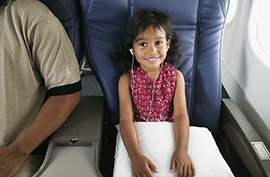 A father watched as his 11-year-old son Seth embarked on a flight alone to visit family. Seeing Seth walk down the runway, he went home, assuming his son would arrive safely. Six hours later, he discovered Seth had walked off the plane before departure. He left the airport, stopped at a gas station for directions and trotted 30 miles along an interstate to his home town.
A father watched as his 11-year-old son Seth embarked on a flight alone to visit family. Seeing Seth walk down the runway, he went home, assuming his son would arrive safely. Six hours later, he discovered Seth had walked off the plane before departure. He left the airport, stopped at a gas station for directions and trotted 30 miles along an interstate to his home town.
If you are allowing your children to fly alone, be sure to take every necessary precaution to ensure their safety. Millions of children fly alone each year, the majority without incident. But Seth's case should be a warning to parents: Be sure you and your child are prepared for the trip.
Airlines generally consider children ages 5 - 14 who travel without a parent or guardian to be "unaccompanied minors." Many airlines will not allow children 7 and under to make connections at all, but in the event a minor is old enough to change planes, they will probably be assisted by airline personnel and a fee will be charged. Some airlines -- Southwest, for example -- will not allow any minor (5 - 11) to change planes. JetBlue will not allow any children under 15 to make a connection.
If you intend to send an unaccompanied minor by plane (with or without a connection), you will be required to fill out a form detailing the child's name, age, medical considerations and other relevant information. Upon arrival, children will be escorted from the aircraft by an airline representative and released to the person named by you prior to departure.
In addition, you will have to agree that the airline is not taking on any special responsibility of guardianship during the flight. Legally, an unaccompanied minor is treated in the same way as an adult passenger.
Airline rules vary, but here's a good idea of what to expect on domestic flights:
Children ages 1 - 4 may fly only when accompanied by an adult. A child must be at least 5 to fly alone.
Kids ages 5 - 7 can take a direct flight to a single destination but not connecting flights.
Those 8 and up may change aircraft on some airlines. If they're between 8 and 11, they will be escorted by airline personnel to their connecting flight. Older kids -- age 12 and up -- may not be routinely escorted, but you can request this assistance as long as you pay the applicable fee.
Minors must be met at their destination by another parent or responsible adult.
Anyone under the age of 17 who is flying alone on an international flight must have a signed letter of consent from a parent or responsible adult giving permission, destination and length of stay.
As these guidelines vary slightly by airline, be sure to contact your carrier for specific information.
Airlines charge anywhere from $50 to $150 each way for an unaccompanied minor fee. The exact amount will depend on the airline, the age of the of the child and whether the flight involves connections.
Here are the fees charged each way for domestic flights on some of the major U.S. airlines:American: $150
Delta: $150
JetBlue: $100
Southwest: $50
United: $150
Some airlines charge a fee per child, while other carriers will allow multiple children to travel together under a single fee.
Some airlines may not allow unaccompanied minors to fly on the last connecting flight of the day, or on so-called "red-eye" flights between 9 p.m. and 5 a.m. Be sure to read each airline's policies carefully before booking.
After filling out some paperwork and paying the appropriate fees at check-in, one parent or guardian will receive a special pass that will allow him or her to get through the security checkpoint. The parent or guardian must accompany the child to the gate and wait there until the plane takes off.
 Never wait until you have reached the airport to inform the airline that you have a minor traveling unaccompanied. Always provide this information to customer service over the phone, and have them inform you of all your options, fees and so forth.
Never wait until you have reached the airport to inform the airline that you have a minor traveling unaccompanied. Always provide this information to customer service over the phone, and have them inform you of all your options, fees and so forth.
If you can help it, buy your children nonstop tickets only. If a change of planes is necessary, use a small, less intimidating airport for the transfer, if possible. Some airports may even restrict which connecting cities are permitted for children flying alone.
Make sure your child carries plenty of emergency information. For example, leave instructions on how to handle flight delays or cancellations, including emergency contacts and a means to pay for necessities, such as overnight accommodation.
Familiarize your child with his or her itinerary and make sure all travel documents are kept in a safe place -- especially if they'll be needed for a return flight.
Try to book a morning flight. If it is delayed or canceled, you have the rest of the day to make alternate plans.
Small children may have trouble with checked baggage. If possible, stick with a single carry-on bag and a personal item. If not, check your child's checked bag stubs carefully to be sure that the luggage claim ticket and luggage tag match your child's final destination.
Get to the airport early to ease check-in and get children accustomed to their surroundings. If possible, show them where help desks are located and teach them to recognize uniformed employees.
Give your child a picture of the person meeting him or her -- with the full name, address and phone number written on the back. You will need to provide this information to the airline as well.
Make sure the adult meeting your child at the destination airport is carrying photo identification.
Pack some snacks for your child: chips, sandwiches, trail mix or other finger foods like grapes or berries. You may also want to purchase juice or water for your child after you pass through the security checkpoint.
Be sure your child has plenty of things to keep him or her entertained in flight, such as a tablet stocked with games or a few favorite books.
Give your child a little cash to cover incidental expenses and phone calls in the event of an emergency.
If your child doesn't have a cell phone, be sure he or she knows how to place a collect call; you may want to provide a calling card to use in an emergency, as well as a list of numbers to call if necessary.
Just because a 5-year-old is permitted to fly solo, that doesn't mean that your 5-year-old will be able to handle flying alone, especially if your child hasn't flown before. Parents should use common sense and make a decision based on their own child's level of maturity.
American * Delta * JetBlue * Southwest * United
For more family travel tips and ideas, see our sister site, Family Vacation Critic!